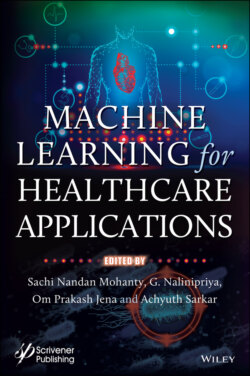Читать книгу Machine Learning for Healthcare Applications - Группа авторов - Страница 43
2.2 Background
ОглавлениеIt is important for everyone to understand their health status, it helps to avoid future diseases. As mentioned previously some of the parameters of the health status are sleep status, smoke status, drink status, disease status, etc. Directly or indirectly they depend on the individual’s daily life activities and physical measures. In healthcare data management, a huge amount of structured or unstructured data related to the patient is generated from the diagnostic reports, doctor’s prescription, and the wearable devices. In recent years the healthcare data analysis and estimating the future health status are the major focused domains in healthcare. Disease Prediction has a major impact on healthcare analytics as it predicts outbreaks of epidemics to avoidable diseases and improves the quality of life. Some of the recent works proposed a verity of models to predict health status a person with the help of various factors. Researchers Sahoo, Mohapatra, and Wu [10], proposed a cloud-based probabilistic data acquisition method and also, designed an approach to predict the impending health state of a person based on the current health status. A work by Hirshkowitz et al. [5], proposed a method to evaluate and recommended sleep duration for individuals based on their age categories. Researchers [9], proposed a new approach for the disease risk prediction, in that they also proposed the Convolutional Neural Network (CNN) based on unimodal disease risk prediction and CNN-based Multimodal Disease Risk Prediction. Reseachers Weng, Huang, and Han [2], discussed different types of artificial neural network (ANN) techniques for disease prediction and evaluated all the methods based on statistical tests. Researchers [7], proposed a system to collect health data through some questionnaires and analyzed using deep learning architectures.
A work by Tayeb et al. [12], proposed a method based on the popular machine learning algorithm KNN to predict heart disease and chronic kidney failure. Researchers [6] proposed an automated system for the prediction of stroke based on Electronic Medical Claims (EMCs), and they compared the Deep Neural Network (DNN) with the gradient boosting decision tree (GBDT), logistic regression (LR) and support vector machine (SVM) approach. Researchers [8] proposed the cloud-based smart clothing system for sustainable monitoring of human health. They also discussed the technologies and the implementation of methodologies. Reseachers Schmidt, Tittlbach, Bös & Woll [11], analyzed varieties of physical activity, fitness and health, they considered 18 years duration for study and identified interesting insights. In a recent work on Analyzing University Fitness Center data [14], the user’s fitness activity data is collected to predict the crowd at the fitness center. But the fitness activity data can be used to predict more than that.
A lot of research was done on measuring health parameters numerically. Also, there are many works on calculating some health parameters from other parameters. A work by Harris-Benedict [4] calculates Basal Metabolic Rate from an individual’s physical measures. It is used to estimate the number of calories needed for an individual to maintain good health. Our work incorporated the effect of daily life activities on health status. But that data can be used to personalize health predictions and suggestions. This motivated to design a model that predicts health status from the daily life activities of individuals.
